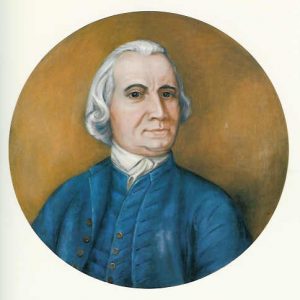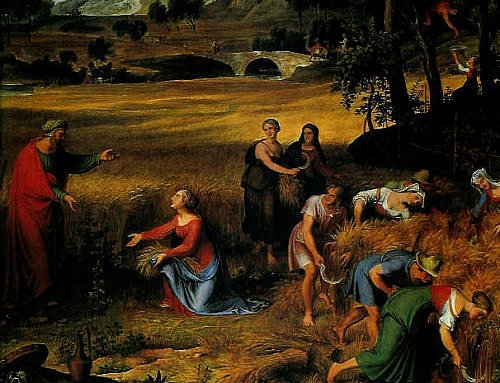Samuel Adams and the Founders’ Faith in the Cause of Liberty, an Example for Today
By Stephen McDowell
We face desperate times today. The growing encroachment by civil government into the affairs of American citizens is leading to ever diminishing liberty, justice, and prosperity. Government leaders, acting as if they possess a title of nobility like King George III, have extended, and continue to attempt to extend, “an unwarrantable jurisdiction over us.”
In the words of the Declaration of Independence, our current civil leaders have:
- “Refused … assent to laws, the most wholesome and necessary for the public good” — like ignoring immigration laws prohibiting illegal aliens from entering the country, especially criminals who have taken the lives and property of many Americans.
- “Erected a multitude of new offices and sent hither swarms of officers to harass our people and eat out their substance” — the ever growing size of the national government, and its attending offices, require an ever-increasing amount of money. Our unbiblical system of graduated income taxes leads to IRS agents “harassing our people.”
- “Combined with others to subject us to a jurisdiction foreign to our constitution and unacknowledged by our laws” — consider the various treaties we have entered into, as well as those we are considering that deal with climate change.
- “Abdicated government here by declaring [innocent human life] out of his protection and waging war against [the unborn]” — one of the first acts of President Obama was to restore government funding for various international groups that promote abortions. Tax dollars are used to support Planned Parenthood, who in 2014 murdered over 327,000 unborn children in America, and we are now learning they profit from selling the body parts of those they aborted.
- “Alter[ed] fundamentally the forms of our government” — The massive one trillion dollar “stimulus bill,” governmental bailouts of failing businesses, huge expansion of welfare payouts, and shutting down coal plants and other businesses via EPA regulations are transforming America from a free capitalistic system that values individuals to a socialistic system that values the state.
- “Abolish[ed] the free system of [our root] laws” — for example, “legalizing” gay marriage and attempting to redefine the family.
- “Abolish[ed] our most valuable laws” — attacking religious liberty and free speech by forcing individuals to act contrary to their religious convictions, especially in regards to accommodating homosexuality.
- “Excited domestic insurrections amongst us” — attempting to sway the American people, through rhetoric intended to cause panic, to support the new government controlled health care system that is taking medical care out of the hands of people and the doctors they choose and giving it to government bureaucrats, even while the majority of the American people oppose “Obamacare.”
- “Plundered our seas, ravaged our coasts” — mandating how private companies should conduct their business, for example, forcing banks to provide home loans to at risk people (which contributed to past economic crisis); redistributing wealth through government handouts, business subsidies, rebates for buying cars (remember “Cash for Clunkers”), tax breaks for first-time home buyers, and much more.
- “[Interfered with] trade” — bailing out and taking control of private companies, for example, various banks and General Motors (with the President even firing the head of General Motors, which no law authorized). Government deficit spending has amassed an $18 trillion debt that takes funds from the private sector that could be used to expand jobs and create wealth, and it robs future generations. These actions also increase governmental power.
Many acts of our current “Prince” show he “is unfit to be the ruler of a free people.” In addition to actions listed above, President Obama has repeatedly ignored various laws and lied to the America people: 1) He unilaterally changed the Affordable Care Act (a law passed by Congress that he signed) at least 24 times. 2) He is attempting to enter into a treaty with Iraq without the consent of the Senate (as required by the Constitution) that would undermine our security as well as threaten our allies, especially Israel. 3) He has engaged in foreign policy that has strengthened our enemies (Islamic terrorists) in Libya, Syria, Iraq, Egypt (later removed by the Egyptian army), Iran, and elsewhere. 4) In promoting “Obamacare” (which will result in socialized medicine) he has lied multiple times, saying you can keep your doctor and that the government can provide health care for millions of uninsured without increasing the deficit nor diminishing quality (even contradicting the impartial Congressional Budget Office).
These are just a few of the actions of our government that show we face desperate times. Americans have gone through difficult times before. We can learn from their example. Consider the situation the Father of the American Revolution, Samuel Adams, faced in September of 1777.
“Our Cloud by Day and Pillar of Fire by Night”
In the first two years of the War for Independence, the Americans had seen a few successes but many more defeats. With their situation at the end of the summer of 1777, prospects of any more successful battles looked grim, with little hope of overall victory in the war. By September, the army had been driven out of New York and New Jersey and had lost the strategic Fort Ticonderoga in upstate New York.
On September 11, Washington was defeated at the Battle of Brandywine in Delaware. Here the Americans had 200 soldiers killed, 500 wounded, and 400 captured. Ten days later in Pennsylvania, another 300 soldiers were killed or wounded and 100 captured at the Paoli Massacre. The American army was suffering from fatigue due to long marches, little food, and lack of clothes and other supplies. In a few months, when they marched into Valley Forge for winter quarters, Washington would write that being “without shoes,” their “marching through frost and snow . . . might be traced by the blood from their feet.”[1]
The British not only ran the army out of New York and New Jersey, but forced the Congress to flee Philadelphia, capturing that city on September 26. One delegate, John Adams, wrote: “The prospect is chilling, on every Side: Gloomy, dark, melancholly, and dispiriting.”[2] Only twenty members of Congress remained together, gathering one day in York, Pennsylvania, to consider whether there was any hope of success and to see if they should continue the struggle for liberty.
 One of those present was Samuel Adams, a delegate from Massachusetts who had been involved in the cause of independence from the beginning. He would earn the title, Father of the American Revolution, for his bold guidance of Massachusetts in resisting the tyrannical action of England from before the time of the Stamp Act in 1765. The King was well aware of Adams’ leadership in the “rebellion,” placing a bounty on his head and sending troops to capture him. Samuel suffered much in the cause of liberty — he was driven from his home, which was vandalized so badly by British troops it was uninhabitable, he was separated long periods of time from his family, many of his friends were killed, and if America lost the war, he would face the same fate.
One of those present was Samuel Adams, a delegate from Massachusetts who had been involved in the cause of independence from the beginning. He would earn the title, Father of the American Revolution, for his bold guidance of Massachusetts in resisting the tyrannical action of England from before the time of the Stamp Act in 1765. The King was well aware of Adams’ leadership in the “rebellion,” placing a bounty on his head and sending troops to capture him. Samuel suffered much in the cause of liberty — he was driven from his home, which was vandalized so badly by British troops it was uninhabitable, he was separated long periods of time from his family, many of his friends were killed, and if America lost the war, he would face the same fate.
Earlier in the war, a British officer had offered Adams immunity and the chance to make peace with the king of England if he would only recant his views, to which he replied: “Sir, I trust I have long since made my peace with the King of kings. No personal consideration shall induce me to abandon the righteous cause of my country.”[3]
Adams’ faith in God and the cause of liberty were greatly needed that day in late September 1777. He spoke to his fellow congressmen:
“Gentlemen,” said he, “your spirits appear oppressed with the weight of the public calamities. Your sadness of countenance reveals your disquietude. A patriot may grieve at the distress of his country. But he will never despair of the commonwealth.
“Our affairs, it is said, are desperate! If this be our language, they are indeed. If we wear long faces, long faces will become fashionable. The eyes of the people are upon us. The tone of their feelings is regulated by ours. If we despond, public confidence is destroyed, the people will no longer yield their support to a hopeless contest, and American liberty is no more. But we are not driven to such narrow straits. Though fortune has been unpropitious, our condition is not desperate. Our burdens, though grievous, can be borne. Our losses, though great, can be retrieved. Through the darkness which shrouds our prospects the ark of safety is visible. Despondency becomes not the dignity of our cause, nor the character of those who are its supporters.
“Let us awaken then, and evince a different spirit, — a spirit that shall inspire the people with confidence in themselves and in us, — a spirit that will encourage them to persevere in this glorious struggle, until their rights and liberties shall be established on a rock. We have proclaimed to the world our determination ‘to die freemen, rather than to live slaves.’ We have appealed to Heaven for the justice of our cause, and in Heaven have we placed our trust. Numerous have been the manifestations of God’s providence in sustaining us. In the gloomy period of adversity, we have had ‘our cloud by day and pillar of fire by night.’ We have been reduced to distress, and the arm of Omnipotence has raised us up. Let us still rely in humble confidence on Him who is mighty to save. Good tidings will soon arrive. We shall never be abandoned by Heaven while we act worthy of its aid and protection.”[4]
“Good tidings will soon arrive.” Adams’ statement was prophetic, for it was not long after this that one of the most significant battles in history took place — one of the seven most important battles of all time according to one historian. On October 17, 1777, British General John Burgoyne was defeated by colonial forces under the command of Horatio Gates at Saratoga, New York. General Washington called it a “signal stroke of Providence.”[5]
“The arm of Omnipotence” was evident in the victory. Prior to Burgoyne’s surrender, it was intended that British General Howe march north to join Burgoyne’s 11,000 men at Saratoga. However, in his haste to leave London for a holiday, Lord North forgot to sign the dispatch to General Howe. The dispatch was pigeon-holed and not found until years later in the archives of the British army. This inadvertence, plus the fact that contrary winds kept British reinforcements delayed at sea for three months, totally altered the outcome at Saratoga in favor of America.
Why was this battle so significant? The victory turned the tide of the war. It brought some military booty — 27 pieces of artillery and thousands of small arms and ammunition. More importantly it brought great encouragement to the nation. After receiving details of the victory the president of the Congress Henry Laurens wrote, “the glorious intelligence is now extending from City to City diffusing Joy in the heart of every Loyal American.”[6] Of greatest importance, however, was that France decided to become an ally of America, seeing that, through this victory, America could possibly defeat France’s long-time enemy. France would later send much needed money and troops, which secured the ultimate victory for the new United States.
Adams was thrilled with these “good tidings” brought about by God’s providence. He wrote to Samuel Savage in Massachusetts, “Our sincere Acknowledgements of gratitude are due to the Supreme Disposer of All Events. I suppose Congress will recommend that a Day be set apart through out the United States for solemn Thanksgiving.”[7] Congress did recommend such a day, adopting on November 1 a resolution drafted by a committee of three, which included Samuel Adams, proclaiming Thursday, December 18, as a day of Thanksgiving to God. This day “for solemn thanksgiving and praise” was set aside so that:
With one heart and one voice the good people may express the grateful feelings of their hearts and consecrate themselves to the service of their Divine Benefactor, and that together with their sincere acknowledgments of kind offerings they may join the penitent confession of their manifold sins, whereby they had forfeited every favor, and their humble and earnest supplication that it may please God, through the merits of Jesus Christ, mercifully to forgive and blot them out of remembrance; that it may please him graciously to afford his blessing on the Governments of these States respectively, and prosper the public councils of the whole; to inspire our commanders both by land and sea, and all under them, with that wisdom and fortitude which may render them fit instruments, under the providence of Almighty God, to secure for these United States the greatest of all blessings — independence and peace; that it may please him to prosper the trade and manufactures of the people and the labor of the husbandman, that our land may yield its increase; to take schools and seminaries of education, so necessary for cultivating the principles of true liberty, virtue, and piety, under his nurturing hand, and to prosper the means of religion for the promotion and enlargement of that kingdom which consisteth in righteousness, peace, and joy in the holy Ghost.[8]
“Good tidings will soon arrive.”
Our best hope for overcoming the difficult times we face today and seeing the Godly cause of liberty prevail, is to put our trust and faith in the same God who inspired Samuel Adams and the Founders of America and take action to resist the tyranny of our current government. We must “rely in humble confidence on Him who is mighty to save.” If we act worthy of God’s aid and protection, He will never abandon us. No matter how great our distress, the arm of Omnipotence will raise us up, and we can have confidence that “good tidings will soon arrive.”
End Notes
- Washington to John Banister, April 21, 1778, The Writings of George Washington from the Original Manuscript Sources, 1745-1799. Edited by John C. Fitzpatrick, Washington, DC: U.S. Government Printing Office, 1931, 11:291.
- John Adams diary, in Ira Stoll, Samuel Adams A Life, New York: Free Press, 2008, p. 3.
- William V. Wells, The Life and Public Services of Samuel Adams, Vol. II, Boston: Little, Brown, and Co., 1865, p. 193.
- Wells, 2:492-493.
- Washington to John A. Washington, October 18, 1777, The Writings of George Washington, 9:399.
- Stoll, p. 5.
- Stoll, p. 192.
- B.F. Morris, Christian Life and Character of the Civil Institutions of the United States, Philadelphia: George W. Childs, 1864, pp. 530-531.





